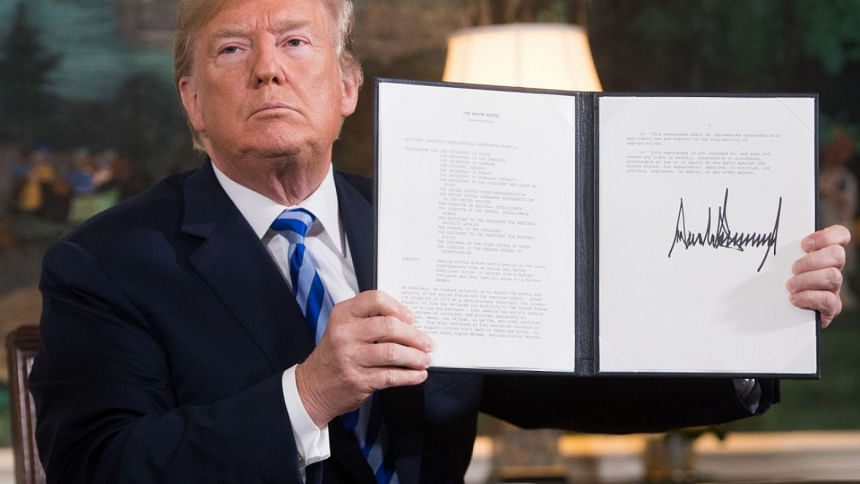Scrapping of Iran nuke deal and the dangerous path of populism

First it was the Transpacific Partnership then the Paris climate agreement and now the Iran nuclear deal that President Trump has succeeded in torpedoing. As for his latest action, he may well feel satisfied that he has at last seen through the implementation of his election promise to do away with what he sees as a bad deal. But his allies, who are cosignatories to the deal, and who had tried to prevail on him unsuccessfully not to go down the dangerous path that such an action might lead to, disagree.
And only Trump and Netanyahu think Iran has been in violation of the deal. Netanyahu excelled himself in a superb theatrical performance a few days back, regurgitating decade-old information. He accused Iran of secretly developing nuclear weapons. But is that not what every nuclear weapon aspirant does? Israel still hides the fact that it possesses nuclear capability—a capability some western countries had helped it to acquire.
Netanyahu had opposed the deal from the very beginning, but with Obama he could cut no ice. Ultimately he got his way with Trump, to see Iran which he considers his worst enemy in the Middle East, to be divested of any capacity to defend itself. With Iraq diminished, Iran was but his natural target and on which Israel's long-term and Trump's short-sighted parochial interest found mutuality. The Israeli prime minister's showmanship was well orchestrated and synchronised to suit Trump's narrative and lend weight to Trump's declaration on the deal that he was about to make. It fooled no one. Perhaps Trump has not bothered to see the recent polls in the US that show an overwhelming 63 percent of the people there do not want it scrapped.
The US president's action mirrored a unique feature of South Asian politics—renounce and do away anything that has the predecessor's name on it. He has tried, not fully successfully though, to do away with Obamacare, and now has scrapped a deal that bears Obama's fingerprints. With the moderate Tillerson out and the hawks like Bolton and Pompeo in, the fate of the deal was made even more inevitable.
The Iran Nuclear Agreement was a deal painstakingly arrived at between Iran and the P5+1 countries and finally inked in July 2015. Since then the IAEA, the only watchdog that we should believe, has certified regularly that Iran has been in full compliance of the agreement.
Much credit must go to Iran for having subjected itself to very intrusive international scrutiny to confirm that it has no intention to use its nuclear development programme other than to meet its energy needs. In fact Iran had suspended its nuclear weapons programme in 2007, a fact that the American intelligence agencies had confirmed. That in itself is a big concession. But that only demonstrates Iran's transparency and honesty in the face of a completely immoral stand of certain countries who insist that Iran must never have nuclear weapons. And some of these very countries had helped Israel to develop nuclear capability, and even suppress knowledge of Israel's retaliatory nuclear strike plan—code named "Samson Option"—should it be attacked. Israel is a nuclear power, though undeclared.
If one country can justify possession of nuclear weapons on moral grounds as a deterrence capability, and that sits well with the nuclear brahmins, why can't these brahmins cede the very same right to another country to attain similar capability to defend itself and maintain its national interest? Is it not justified to subject the Negev Nuclear Research Centre to the same scrutiny that Iran has willingly subjected its nuclear facilities to?
Even if we were to accept that in this imperfect world, despite the much vaunted concept of sovereign equality, where some countries claim to be more equal than the rest, no one country's national interest can or should merit priority over another. But that double standard notwithstanding, the Iran nuclear deal was the best arrangement that ensured Iran capping its nuclear programme alongside the easing of nuclear related sanctions on it.
But Trump's action may not be related entirely to the current US administration's distrust of Iran. It wants to conflate other issues, in Syria and Lebanon in particular, with the deal, to exert pressure on Iran. There is perhaps in the minds of the hawkish lobby to see a regime change in Tehran hoping that ratcheted up pressure by re-imposing sanctions might just help effect that change without realising that the new dispensation, in the most unlikely event of a change in Tehran, might be even worse than the current regime.
Abandoning the deal would in fact, if anything, help the hardliners close ranks with the moderates in the face of what will be seen as a direct assault on Iran's security and economic interests. And Iran may well consider nuclear weapon an option, something it has not done so far. It may not sit idle should Israel launch a pre-emptive proxy attack on Iran's nuclear facilities.
Trump's decision has not only set a dangerous precedent in terms of the sanctity of future international agreements, but also opened the way for future conflicts. However, predicting anything at this point would be going ahead of time. We await Iran's action on ground, not comments. The questions one might ask are: Is the deal dead without the US? Can it survive with Iran and P4+? Will it be wrong for Iran to think that scrapping the deal was only an excuse to push it to a corner to compel a precipitate action from it? Abandoning the deal without an alternative solution suggests that is so.
Trump is set on a dangerous path that his policies prod him on to. But history shows that such policies, stimulated by utterly selfish nationalist and populist considerations, are self-defeating and often lead to one's own ruin.
Brig Gen Shahedul Anam Khan, ndc, psc (Retd) is Associate Editor, The Daily Star.





Comments